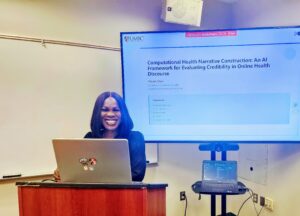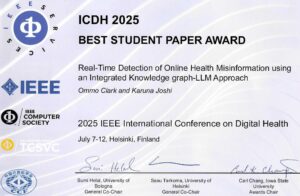Ph.D. Candidate, Information Systems
![]()
Ommo Clark is a Ph.D. Candidate at the University of Maryland, Baltimore County (UMBC) advised by Dr. Karuna Joshi. Her general research interests are in Data Science, AI/ML and Health Informatics.
She works on the Automating the Detection of Health Narrative project.
Ommo has a BA in Business Admin and an MSc in Information Systems both from the UK. She has extensive experience working in the software development industry in the UK and Nigeria. Read more about her at linktr.ee/ommo_clark.
Publications
- O. Clark and K. P. Joshi, “Real-Time Detection of Online Health Misinformation using an Integrated Knowledgegraph-LLM Approach“, IEEE International Conference on Digital Health (ICDH) , 2025 at IEEE World Congress on Services 2025, July 2025 [Best Student Paper Award]
- O. Clark and K. P. Joshi, “Evaluating Causal AI Techniques for Health Misinformation Detection“, Causal AI for Robust Decision Making (CARD 2025) Workshop, held in conjunction with 23rd International Conference on Pervasive Computing and Communications (PerCom 2025), March 2025
- O. Clark, K. P. Joshi, and T. Reynolds, “Global Relevance of Online Health Information Sources: A Case Study of Experiences and Perceptions of Nigerians“, AMIA 2024 Annual Symposium, November 2024.
- Ommo Clark, Tera Reynolds, Emmanuel Ugwuabonyi, and Karuna P. Joshi, “Exploring the Impact of Increased Health Information Accessibility in Cyberspace on Trust and Self-care Practices“, The 2024 ACM Workshop on Secure and Trustworthy Cyber-Physical Systems (ACM SaT-CPS 2024), June 2024
Ommo’s paper received the Best Student Paper Award at IEEE ICDH 2025
Ommo successfully defended her Ph.D. Proposal on 10 June 2025.

Proposal: Computational Health Narration Construction: An AI Framework for Evaluating Trustworthiness in Online Health Discourse
Committee: Dr. Karuna P Joshi (Chair), Dr. Tera Reynolds, Dr. Ian Stockwell, Dr. Kai Sun, Dr. Anupam Joshi (CSEE)
Abstract:
The rapid proliferation of online health narratives profoundly influences public perceptions and medical decision-making. However, most misinformation detection models focus on isolated factual claims, overlooking the epistemic, narrative, and causal coherence of user-generated stories, resulting in “Narrative Blindness” and “Risk Irrelevance”.
This dissertation proposal introduces Narrative-Cred, an AI-driven framework for computational health narration construction, which systematically reconstructs fragmented online health stories into structured Agent-Action-Outcome (AAO) narratives. By integrating transformer-based narrative segmentation (DistilBERT), biomedical knowledge graph validation (UMLS, SNOMED CT, DrugBank), and causal inference models (CausalBERT, DoWhy), Narrative-Cred enables nuanced, context-sensitive credibility assessment and risk quantification.
Key innovations include the Narrative Ground-Truth Distance (NGTD), a continuous metric quantifying divergence from medical consensus, and the Narrative Risk Score (NRS), a clinically informed prioritization of harmful narratives. The framework is validated on a longitudinal corpus of 16,000 Reddit posts and cross-cultural survey data spanning seven countries. By embedding sociolinguistic narrative theory within modern AI architectures, this research establishes a new paradigm for evaluating the trustworthiness of online health discourse, offering rich, explainable, and clinically relevant assessments that surpass traditional binary classifiers.
